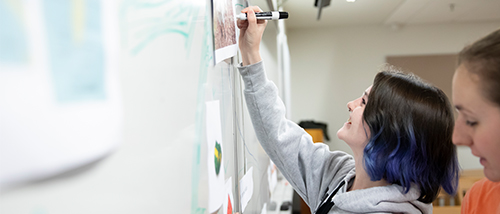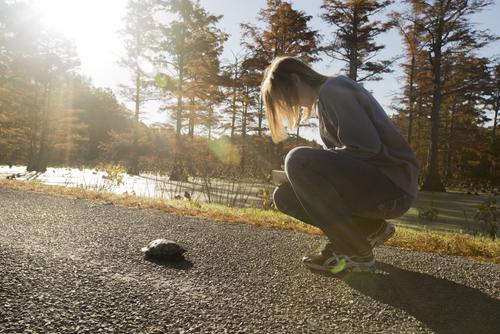Wildlife and Conservation Biology
Continue to main content
Wildlife and Conservation Biology (BS) Degree Map
Explore the courses you'll need to complete your degree.
Outcomes & Careers
-
$77k
Wildlife Biologist
According to the Bureau of Labor Statistics, the mean annual salary for zoologists and wildlife biologists is $77,920.
-
$74k
Conservation Scientist
According to the Bureau of Labor Statistics, the mean annual salary for a conservation scientist is $74,310.
-
$64k
Conservation Technician
According to the Bureau of Labor Statistics, the mean annual salary for forest and conservation technician is $64,640.
The wildlife and conservation biology curriculum includes coursework to prepare you to continue your education in graduate school or to start your career. You’ll complete a minimum of 120 credit hours to complete this degree, including the general education requirements and at least 39 senior division hours.
Required Courses:
- BY163 Evolution and Ecology (4)
- BY173 Cell and Organismal Biology (4)
- BY283 Genetics (4)
- BY389 Career Development in Biology (2)
- CH184 General Chemistry I Lab (1)
- CH185 General Chemistry I (3)
- MI101 Introduction to Microcomputer Applications (3)
Choose one math course:
- MA116 Precalculus A (3)
- MA137 Precalculus (5)
- MA139 Applied Calculus (3)
- MA140 Analytical Geometry and Calculus I (5)
Experiential Learning Requirement: 2 hours
- BY551-553 Biology Field Studies (2)
- BY563-565 Experience in Museum Curation (1-3)
- BY570 Development of Instructional Materials (1)
- BY582 Internship in Biology (1-3)
- BY589-591 Biological Research (1-3)
Wildlife and Conservation Option Required Courses:
- BY332 General Ecology (3)
- BO310 Plant Biology (4)
- ZO310 Zoology (4)
Choose 6 Hours From:
- BY420 Management of Wildlife Populations (3)
- BY430 Management of Wildlife Habitat (3)
- BY435 Conservation Biology (3)
- BY440 Wetland Ecology and Management (3)
- BY469 Wildlife Disease (3)
Biology Electives: choose at least 6 Hours not selected above
- Any BY, BO, ZO, BT courses, 300 level and above (6)
Non-Biology Requirements: 3 Hours
- GO110 Physical Geology (3)
- GT101 Introduction to GIS 1 (3)
- MA223 Elementary Probability & Statistics (3)
- Social and Behavioral Sciences – 6 hours
- Constitution Requirement – 3 hours
- Written Communication – 6 hours
- Oral Communication – 3 hours
- Natural Sciences – 7 hours (from two disciplines, one to include a lab)
- Mathematics – 3 hours
- Humanities & Fine Arts – 9 hours (from at least two disciplines)
- Additional requirements – 5 hours (to include UI100 for native students)
- Civics examination
First Year
Fall Semester (15-17 Hours)
- UI100 (1)
- BY163 (4)
- CH184/185 (4)
- MA116/137/139/140 (3-5)
- MI101 (3)
Spring Semester (16 Hours)
- BY173 (4)
- EN100 (3)
- MA223 (3)
- General Education (3)
- General Education (3)
Milestone: achieve a target cumulative GPA of 3.0
Second Year
Fall Semester (14 Hours)
- BY283 (4)
- BY332 (3)
- GT101 (3)
- General Education (3)
Spring Semester (14 Hours)
- BY389 (2)
- GO110/010 (3)
- BY Wildlife Elective (3)
- General Education (3)
- General Education (3)
Milestone: achieve a target cumulative GPA of 3.0
Third Year
Fall Semester (15 Hours)
- ZO310/010 (4)
- Bi Wildlife elective (3)
- Experiential Learning Crs (2)
- General Education (3)
- General Education (3)
Spring Semester (15 Hours)
- BO310 (4)
- BY Wildlife Elective(3)
- Biology elective (3)
- General Education (3)
- Elective (3)
Milestone: achieve a target cumulative GPA of 3.0
Fourth Year
Fall Semester (15 Hours)
- Biology Elective (3)
- Elective (3)
- Elective (3)
- Elective (3)
- Elective (3)
Spring Semester (15 Hours)
- Elective (3)
- Elective (3)
- Elective (3)
- Elective (3)
- Elective (3)
Milestone: achieve a target cumulative GPA of 3.0
A “Milestone” signifies a significant stage for a student in the completion
of a degree.
What will it cost?
Become a Redhawk.
Do more than dream about the future. Take the first steps to make it all happen.
How Do Students Gain Experience?
At Southeast, a biology education goes beyond the classroom. The student chapter of the Wildlife Society provides peer support, activities, and guidance for students. Our students are also gaining valuable experience to complement their classroom work with internships and field experiences at:
- Missouri Department of Conservation
- World Bird Sanctuary
- Army Corps of Engineers
- Madikwe Game Reserve in South Africa
- Whiterock Nature Preserve
- Black Hills, South Dakota
Hands-on Learning
You’ll gain hands-on real-world experience through required 80 hours outside the classroom, gaining experience conducting, presenting, and publishing research.
Cape Girardeau, Missouri 63701

